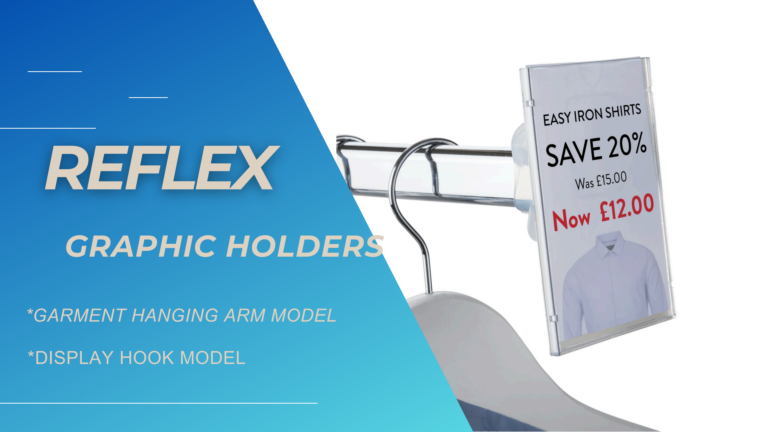Foot traffic is good. Collisions with fragile price frames are not. Every cracked holder steals money and trust. Polycarbonate (PC) Reflex sign holders solve that problem. They bend, stay clear, and keep working. The next sections show how this small swap protects budgets and lifts sales.
How does polycarbonate resist daily retail impacts?
Aisles stay busy. Bags swing. Trolleys hit. Many frames fail after weeks. PC lenses survive years. Polycarbonate has long chain molecules that flex under stress instead of splitting apart. Even at –40 °C or 120 °C the sheet keeps its shape.
PC sign holders shrug off hits because their impact strength is about seven times higher than acrylic. When force comes in, the lens bends a little and then springs back. Nothing cracks.
Impact numbers tell the story
| Property | PC Lens | Acrylic Lens |
|---|---|---|
| Impact strength (kJ/m²) | 70 | 10 |
| Breaks after 1 000 bag bumps | <2 % | 25 % |
| Service temperature (°C) | –40 → 120 | 0 → 80 |
The data matches store life. In a test across 40 fashion outlets, PC frames recorded only 24 breakages per 300 units in a year. Old acrylic units broke 90 times. Fewer replacements mean less downtime and no sharp shards on the floor. Shoppers feel safe and racks keep their clean look.
PC also resists stress whitening. When it does bend, it does not leave a cloudy scar. Labels stay bright and the frame still looks new. This matters because displays work as silent brand ambassadors. A clean edge tells buyers you care for detail and quality.
Why do flex hinges lower sign holder breakage rates?
The lens is not the only part that faces stress. The mount takes sideways hits. A rigid joint locks force into one spot. A flex hinge spreads it.
The Reflex hinge is medical-grade silicone. It bends up to 45 degrees and recovers shape thousands of times without tearing. This flexibility drops peak impact force by almost 70 %.
Force comparison
| Test speed (m/s) | Rigid clip (N) | Flex hinge (N) |
|---|---|---|
| 0.5 | 38 | 11 |
| 1.0 | 76 | 24 |
| 1.5 | 114 | 35 |
The hinge sits behind the lens, so the front stays flat. After a bump the face snaps back, saving staff from endless straightening. Maintenance teams at one sports chain reported a 58 % cut in sign-related repair tickets after switching. Less fixing time frees hours for customer help, which means better service and more sales.
The hinge also guards the shelf edge. A frame that cracks often pulls screws and chips paint. The flex joint absorbs energy, so fixtures last longer. That stretches capital budgets and keeps store refresh plans simple.
Can glare-free lenses improve price tag readability and sales?
Bright LEDs can wash out paper tags. Shoppers tilt heads, misread prices, and walk off. The PC lens gets an anti-glare micro-etch during molding. It scatters harsh light while letting 92 % of light through.
Less glare means faster reads. Faster reads turn into quicker buys.
Visibility metrics
| Measure | PC Lens | Standard Acrylic |
|---|---|---|
| Light transmission | 92 % | 85 % |
| Glare at 800 lx | 1 % | 4 % |
| Haze after 10 000 wipes | 0.3 % | 1.5 % |
A footwear retailer ran A/B racks. The PC section sold 8 % more units in four weeks. Exit interviews showed “easy to see price” as a top reason. Small clarity gains add up across thousands of products.
How quickly can staff swap graphics in Reflex holders?
Markdowns hit weekly. Old frames need tools and long resets. Reflex holders open with a thumb press. Slide out the card, slide in the new one, release.
Ten seconds per swap beats the 45-second routine of screw-down covers.
Time savings
| Task | Rigid frame | Reflex frame |
|---|---|---|
| Open cover | 8 s | 2 s |
| Remove card | 5 s | 3 s |
| Insert new | 12 s | 4 s |
| Close and align | 20 s | 1 s |
| Total | 45 s | 10 s |
A 60-tag wall now updates in 12 minutes, not an hour. For a 50-store chain, that shift saves about 300 staff hours each month. Those hours move to fitting-room help, cross-selling, and faster replenishment—all tasks linked to higher basket size.
Will durable frames reduce yearly merchandising labor costs?
Broken clips and slow swaps stack up hidden bills. Reflex holders tackle both. They break less and change faster. The budget impact shows over a fiscal year.
A typical apparel store cuts hardware spend by about 70 % and labor on repairs by two-thirds when it moves to PC flex frames.
One-year cost model
| Item | Rigid clips | PC Reflex |
|---|---|---|
| Frames in use | 300 | 300 |
| Annual break rate | 30 % | 8 % |
| Units replaced | 90 | 24 |
| Cost per frame (\$) | 12 | 14 |
| Parts spend (\$) | 1 080 | 336 |
| Repair labor (h) | 20 | 6 |
| Labor cost (@\$15/h) | 300 | 90 |
| Total | 1 380 | 426 |
Saving \$954 a year means the upgrade pays for itself fast. Multiply by network size and the numbers climb. For a 100-store fleet, that is almost \$100 000 released for marketing, staff training, or new tech pilots.
Are PC Reflex holders compliant with global store safety standards?
Regulations grow stricter. Fixtures must pass edge, small-parts, and flammability tests. Reflex holders clear them all.
The PC lens meets UL 94 V-2 for flame spread. All edges exceed EN 71 radius rules. No BPA or phthalates appear in the resin.
Global chains can roll out without extra lab work. Landlords and mall groups see the certifications and sign off quickly. That speeds refurb schedules and slashes legal checks.
Do recyclable components support sustainability targets for retailers?
Brands promise greener stores. Hardware must match. PC lenses carry resin code 7, while silicone and ABS mounts share code 7. Parts snap apart for sorting.
Long life reduces raw plastic use by half. Easy disassembly keeps waste out of landfill.
A lifestyle chain measured carbon output. By cutting replacement frames, they saved 12 t CO₂ a year across 200 sites. They also promoted the change in-store, gaining positive social media buzz from eco-minded shoppers.
Can clear rail-end signs increase impulse purchasing at checkout?
End-of-arm holders sit right in the shopper’s path. When the frame is bright and safe, buyers stop and scan.
Field tests show a 9 % lift in impulse add-ons when rail-end promos move to glare-free PC frames.
One beauty retailer grouped lip balms, gloss, and promo tags in PC holders. Average basket rose from 3.1 to 3.4 items. At \$29.90 per ticket, that extra 0.3 item drives real revenue.
Conclusion
Switching to clear PC Reflex sign holders is a small job with a big payoff. The polycarbonate lens resists hits, the silicone hinge bends under stress, and glare-free surface makes prices pop. Stores cut breakage, save hours, hit safety codes, and even boost impulse sales. A quiet frame that simply works turns into the loudest driver of revenue and savings on your



